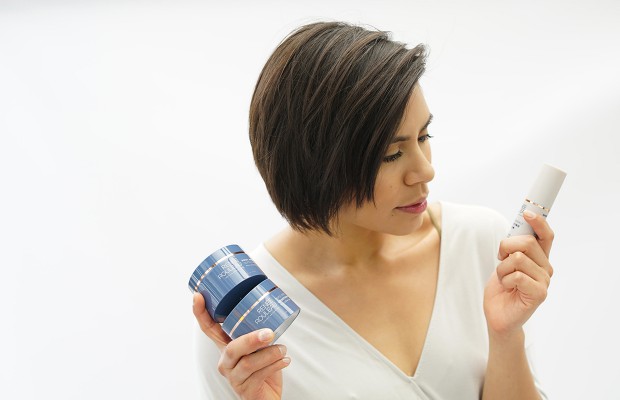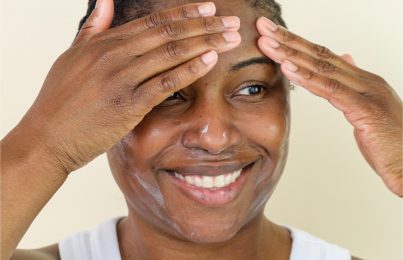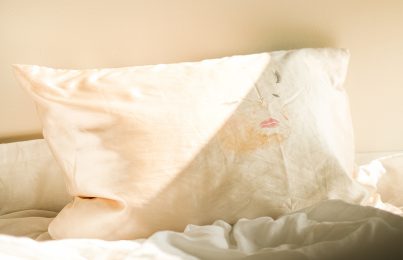Updated 12/1/17. I often hear people describing their skin as “dry on top but oily underneath.” Well, I’m here to set the record straight—you can’t have both dry and oily skin. If your skin is producing oil but still feels “dry,” what you’re actually experiencing is dehydration. Keep reading to learn how to fix this problem and how to differentiate between dry and dehydrated skin.
What is Dry Skin?
Dry skin is classified as skin that produces little to no oil and has small pores. This lack of oil causes dryness and flakiness, especially with age. Dry skin is a genetic condition. Some people are just born with fewer oil glands than others.
What is Oily Skin?
Oily skin is classified as skin that produces oil and has visibly larger pores. This causes the skin to get greasy and have a shine. Oily skin is a genetic condition characterized by active oil glands. Oily skin types are prone to clogged pores and breakouts.
What is Dehydrated Skin?
Dehydration is a temporary skin condition, not a genetic skin type. It is often found in oily, combination or normal skin that is lacking water (not oil), which causes the skin to feel tight. (Watch this quick video to see what dehydrated skin looks like.)
I often hear people with oily skin types saying their skin is feeling dry, but they’re still getting breakouts and aren’t sure how to treat this combo. This is a telltale sign that someone is dehydrated. If you’re getting breakouts or clogged pores, your skin is producing oil. If your skin is producing oil, you can’t be a true dry skin type. It’s that simple!
To remedy what feels like both dry and oily skin, these people might start using a heavy moisturizer formulated for dry skin, but this can cause more clogged pores, bumps, and breakouts. Sound familiar? Sometimes they think it’s because they don’t drink enough water, but hydration levels in the skin have very little to do with drinking water, despite what you’ve always been told.
The truth is that if your skin is naturally oily but acting “dry,” the underlying issue is probably something to do with your skincare routine. You may be using something too harsh.
Learn more about the differences between dry and dehydrated skin, as well as how to best care for it.
How to Treat “Dry and Oily” (A.k.a Dehydrated) Skin
In my thirty years as an esthetician, I’ve observed that the underlying cause of dehydration is usually harsh or drying skincare products. Here are some of my expert tips to get your skin healthy and balanced and alleviate the tight feeling caused by skin dehydration.
Choose Your Cleanser Carefully
Many foaming or gel cleansers are still formulated with ingredients called Sodium Lauryl Sulfate, Sodium Laureth Sulfate or Ammonium Laureth Sulfate. These are known as surfactants, which are cleansing agents that cut oil from the skin. While oily skin types do need the oil and shine to be broken down and removed by a cleanser, these ingredients are not in alignment with your skin’s natural pH and will strip too much water out of the skin after every washing. This is what leads to dehydration.
It’s important to know that what you cleanse with is the MOST important part of your skincare routine. Why? Because if you wash with a cleanser or soap that is too strong and drying, it pulls all the water out of the skin and creates a buildup of dead skin cells. The rest of your routine is then dedicated to trying to make up for this dehydration. When buying a cleanser, look for the words ‘sulfate-free’ on the bottle as this will imply that it’s a safe formula. You can get your skin properly cleaned while keeping the water in your skin where it belongs. Every good skincare routine should begin with a gentle cleanser.
Never Leave Your Skin Bare After Washing
After cleansing, you should quickly layer on an alcohol-free toner, serum (optional), and moisturizer. If you leave your skin bare for more than sixty seconds, it will start to dehydrate. After cleansing, it’s best to immediately apply an alcohol-free toner and then leave it damp on the skin when applying your next product. This way, your serum or moisturizer will lock in the hydrating benefits found in a toner.
Never Skip Moisturizer at Night so Your Skin Can “Breathe”
People with acne-prone skin are often worried about using moisturizer. They believe that it will clog their pores and not let the skin “breathe.” There are a few problems with this type of thinking. First, wearing moisturizer does not directly cause breakouts. Acne occurs when the cells that line the inner pores fail to fall off properly and the pore becomes clogged. This process happens whether you moisturize or not.
Second, respiration doesn’t happen in the skin. The concept of your skin breathing is false.
Those with oily, blemish-prone skin must use moisturizer no matter what. Your skin needs sufficient water to keep it healthy and balanced. The more balanced the hydration levels in your skin, the less likely it is to break out. Skipping moisturizer disrupts the skin’s water levels causing that “oily and dry” feeling we are talking about. This dehydration process actually stimulates more oil production, which potentially causes more breakouts.
The key here is to choose a moisturizer that is suitable for your skin type. Dry skin types need moisturizers that deliver oil into the skin while oily skin types require a moisturizer that gives water.
Use a Humidifier During the Winter Months.
If the air is moist, then the moisture in your skin will likely stay put rather than evaporating into the dry winter air. Learn more about how a humidifier can benefit your skin (and health!).
Use a Serum Underneath Your Moisturizer.
By applying a few drops of a lightweight, water-based skin serum underneath a moisturizer, you’ll get much-needed hydration to alleviate that tight feeling. I usually suggest that my clients with oily skin use Skin Drink Concentrate.
In summary, if you feel like you have dry, oily skin and your skin is feeling tight, you simply need to use a skincare routine that does a better job at balancing the water levels in your skin. It’s an easy fix!
Celebrity Esthetician & Skincare Expert
As an esthetician trained in cosmetic chemistry, Renée Rouleau has spent 30 years researching skin, educating her audience, and building an award-winning line of products. Her hands-on experience as an esthetician and trusted skin care expert has created a real-world solution — products that are formulated for nine different types of skin so your face will get exactly what it needs to look and feel its best. Trusted by celebrities, editors, bloggers, and skincare obsessives around the globe, her vast real-world knowledge and constant research are why Marie Claire calls her “the most passionate skin practitioner we know.”




Comments:
Good day. I think I found this post very revealing.I’ve been having a skin problem for almost two years now that doesn’t seem to go away. I think it started one morning when I woke up and my skin looked very white and dry too like it was peeling off.I think i used a harsh bleaching cream but dont know for sure.whenever I bath,my skin immediately gets very dry and I always have to use cream to reduce its visibility and even with the cream,it still doesn’t feel much better,my skin now looks very rough and wrinkled at times like not smooth at all and the whitenings are the most embarrassing. I’ve used every possible cream and even face cleanser but to no avail. I don’t know if you know first of all what could be wrong with me and what can be done. Thanks a lot
Posted By: Laurent Stephen |
Hello! For your concerns, I would suggest trying the Moisture Protecting Cleanser, Bio Calm Repair Masque, and Pro Remedy Oil. These products will help restore your barrier without congesting or contributing to breakouts!
Posted By: Ella Stevenson |
Hello!
I’m a little confused with my skin. I do not have a skin care routine and don’t wear makeup very often. My problem is that my skin IS very oily but ALSO dry. (My nose flakes ALL the time.) Some spots on my face have clogged pores, others do not. I’m hesitant to try any skin care routine in fear that it’ll further damage my skin. I will say that whilst I’m showering, I’ll use baby shampoo to cleanse my face. I’m trying to get a daily routine going and would like a little direction. Thanks!
Posted By: Kai |
Hi Kai, I can assure you that baby shampoo is much too drying to your skin. Take my skin type quiz to get products recommended for your skin type.
Posted By: Renée Rouleau |
Hi
I have really dry and oily skin. I have really big pores on my nose and cheeks. I have very sensitive skin and I don’t know which product to use.
Posted By: Josie |
I suggest that you take my skin type quiz to determine your skin type and which products of mine are best for you to use to balance your skin.
Posted By: Renée Rouleau |
Hi,
I just found this blog as I tried searching for more information about my skin and I really find this helpful. My main concern is the acne breakout that I occasionally will face and then, the terrible blackheads as well as whiteheads which appear mostly on my nose and some on my cheeks. I used to have a flawless skin until I used the wrong moisturizer last year. My self-esteem just plummeted when I had a severe acne breakout all over my face for the first time. So, I went for facial several times and I managed to recuperate from such problem but, I still face mild acne breakout from time to time. Also, I even changed my old moisturizer to Kiehl’s Ultra-Facial Oil Free Gel Cream (fresh hydration for normal to oily skin) and I changed my old toner to Kiehl’s Calendula Herbal-Extract Toner (Alcohol-free) and these are the products recommended to me by the skin skin specialist. Ever since then, I saw improvements on my skin. But then again, I am just curious about why do I still have blackheads and whiteheads on my nose and cheeks? At the same time, is it normal for my skin to feel oil especially on my T-zone after applying the moisturizer? How do I know if my moisturizer is not suitable or suitable for my skin?
Posted By: Kimberly |
Hello Kimberly, I’m so sorry you’re having a tough time with your skin. As for blackheads, there isn’t a way to make blackheads go away permanently and never come back. I do however, have a lot of great posts for you to read here on my tips to help minimize blackheads. As for whiteheads, your best bet there is to make sure you’re exfoliating REALLY WELL at home. It sounds like oil and bacteria are getting trapped under your skin’s surface which can cause those. I would recommend that you take my Skin Type Quiz to see how often exfoliating products are recommended for your skin type.
Posted By: Renée Rouleau |
I’m concerning the list of sulfates you had said which strips the face of its natural oils, leaving the face bare and dry. Is it all sulfates that do this? Or only those three that you had listed… I’m only inquiring because I had gotten this new cleanser that contains sodium C-14-16 olefin sulfonate and other harmful sounding ingredients. I would love some advice whether I should give it a try or look around for more safer options for my skin.
Thank you so much! 🙂
Posted By: Andrea |
Hi Andrea, Great question! The ingredient you mentioned (Sodium C-14-16 Sulfonate) is a good surfactant derived from coconut and generally will not dry out the skin the way that sulfates will do. Of course, it depends on what other ingredients are used in the formula too, so the best thing to do is to use it on your skin and see how it feels.
Posted By: Renée Rouleau |
Hi,
I found this article really helpful, but I am still confused over what I should and shouldn’t be doing for my skin. I have incredibly oily skin, however, along my nose my foundation NEVER ever sits right. It goes incredibly patchy and dry and looks like my nose is flaky, however, throughout the day my pores will produce a lot of oil…so it just looks like an oily/flaky mess…even though that doesn’t seem to fit in with any skin description. What should I do?
Posted By: Phoebe |
It sounds like your moisture barrier on the nose is disrupted which is why you get flaky. Generally, one of two things is happening. You’re either exfoliating too much on your nose or not enough. I see this a lot. I’m not sure which one of the two it is for you, but take my skin type quiz to see how much you should be exfoliating at home. Also, something you’re using could be drying you out. The skin is thinner on the nose (especially the top) and doesn’t get as oily across the bridge.
Posted By: Renée Rouleau |
My name is Autumn and I’m 22. My skin is not prone to breakouts, but it’s sensitive and turns red easily. I have greasy skin with large pores on my nose, chin, and cheeks, and dry, flaky skin on my forehead, browline, the bridge of my nose, and under my eyes. I am currently not using any products and would like to know any advice you have and what you would recommend.
Posted By: Autumn |
It sounds like the products you are using are too strong for your skin and you’re getting “surface dry”. Take our skin type quiz here to get products recommended. My guess is that you’re a skin type #4.
Posted By: Renée Rouleau |
Hi i am fed up i dont know what is my skin type. Overall it is dry but pores problem on cheeks.the cheek area is Bumpy but no pimples. Wrinkles around eye i am 25. Skin looks aged. Fine lines around lips. What products to Use? Which face wash which toner which moisturiser. really confused. Dying for a perfect skin.
Posted By: Dimple |
You can take our skin type quiz here to get products recommended.
Posted By: Renée Rouleau |
Hi. I have a question. What is my skin type? I have an oily t-zone with large pores around it. Harsh products make face dry, but gentle cleansers does not (I use cream cleanser with toner & moisturizer, but I don’t moisturize all the time b/c I would wake up oily). Occasional small bumps on jaw, mainly b/c of the food I eat. I can go a few days w/o washing face, & it wouldn’t get dry, but I’ll look dark & dull. Climate here is humid, subtropical. Thanks.
Posted By: India |
I recommend you take my Skin Type Quiz here.
Posted By: Renée Rouleau |
and is it ok to use oily / combination cream for the dry skin? my problem is that the dead skin accumlated so fast and at the same time when I try to exfoliate even in a soft way it leave my skin scratch 🙁
Posted By: sara |
It sounds like you should use a gentler exfoliator. You can use one with ROUND beads that don’t scratch the skin like Mint Buffing Beads or any of my gentle acid exfoliators found here. As for using an oily/combination cream for dry skin, you really want to be using the right products for what your specific skin type needs. Read more here.
Posted By: Renée Rouleau |